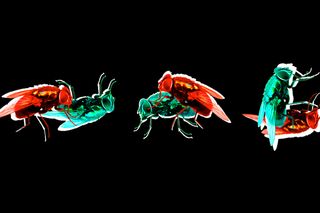
Humans Aren’t The Only Species Facing a Male Fertility Crisis
Climate change is damaging insect sperm.

Amid reports that sperm counts, at least among men in the West, have reportedly dropped by half in the last four decades, comes news that male animals might also be on the verge of their own male fertility crisis — male insects, specifically. And it’s all due to climate change.
The research team, from the University of East Anglia, focused on the red flour beetle (Tribolium castaneum) a beetle of Indo-Australian origin found in warmer climates. The red flour beetle is, quite simply, a pest that attacks stored grain, cereals, nuts and other food products. Which begs the first question: Should we care if fewer of them are around?
The red flour beetle’s survival matters because it’s an insight to the survival of all biodiversity. “Beetles are thought to constitute a quarter of [all] biodiversity, so these results are very important for understanding how species react to climate change,” says Kirs Sales, the postgraduate researcher who led the study. The biodiversity that could be affected by climate change includes mammals, and hence, humans, Sales notes. “Research has also shown that heat shock can damage male reproduction in warm-blooded animals, too, and past work has shown that this leads to infertility in mammals,” he explains.
Sales and team’s findings, which were published in the eminent journal Nature Communications, are bad news for everyone, then.
They found that one simulated heatwave reduced male beetles’ sperm production by three-quarters, and damaged sperm inside females’ reproductive tract. (Female beetles’ reproductive functions appeared unaffected.) Ultimately, it halved the number of offspring from male beetles. A second heatwave nearly sterilized the male beetles.
The researchers simulated a heatwave — an extreme weather event expected to increase in frequency and intensity due to climate change — by exposing some of the beetles to temperatures 5 to 7 °C higher than the beetles’ optimal living temperature for five days.
The effects of rising temperatures appear to cross generations, too; the offspring that heatwave-exposed male beetles did manage to produce lived shorter lives than the offspring of optimum-temp male beetles.
“We know that biodiversity is suffering under climate change, but the specific causes and sensitivities are hard to pin down,” says Matt Gage, a professor in the University’s School of Biological Sciences, and one of the study’s leaders. “We’ve shown in this work that sperm function is an especially sensitive trait when the environment heats up…. Heatwaves are particularly damaging extreme weather events. Local extinctions are known to occur when temperature changes become too intense. We wanted to know why this happens. And one answer could be related to sperm.”
Liesl Goecker is The Swaddle's managing editor.
Related


How to Keep People From Lying To Your Face
